- Home
- Joel C. Rosenberg
The Tehran Initiative Page 15
The Tehran Initiative Read online
Page 15
David had explained that D-day was set for January 28, 1980.
“Zalinsky got the team to the main airport in Tehran. They were going through passport control, and my parents were absolutely terrified. They weren’t convinced your parents’ plan was going to work. But your father and Mr. Zalinsky kept insisting that if the tickets and passports said they were Canadians, then the guards at the airport would accept it. And they did. So before Khomeini’s thugs knew what was happening, your parents, mine, and the others were taking their seats on board Swissair flight 363, heading for Toronto via Geneva.”
Marseille felt her eyes misting. She had finally gotten the story she’d always wanted to hear, but she had never been able to talk about it with her mom. That very Tuesday morning when their fishing party was supposed to be picked up from the island in the middle of the desolate Gouin Reservoir, deep in the interior of the province of Quebec, had been September 11, 2001. Under orders from Osama bin Laden, nineteen Middle Eastern terrorists had hijacked four American civilian jetliners. They’d flown two of those planes into the Twin Towers of the World Trade Center in Manhattan. Marseille’s mother had worked in the South Tower and had perished in the attack.
She’d never been able to talk about it with her father, either. After his wife’s death, he had emotionally imploded, quit his job, sold their family home in Spring Lake, New Jersey, and moved them to his parents’ farm just outside of Portland. She’d never seen her friends again. She’d been forbidden to have any contact with David. She’d lost not only her mother but her childhood and her past, and it had left a gaping wound from which Marseille had never fully healed. And then her father had committed suicide—on September 11, just last year—and she was essentially all alone in the world. Free from her father’s consuming and debilitating pain, but alone nonetheless.
Now she was on a personal quest of sorts to make sense of it all, to get answers, to find closure, and to figure out where she was going to go from here. Reconnecting with David was part of the journey. She didn’t think she’d have had the courage to reach out to him on her own. But then fate stepped in. A wedding was planned. Her best friend from college wanted her to be a bridesmaid. In Syracuse, of all places. It gave her a reason to see David again after all these years, and to her astonishment and relief, he had graciously accepted her invitation. It was a step, and a good one. But that was not all.
Unraveling the mystery of her father’s secretive past had to be part of the quest as well. After his death, she had taken care of his estate and sifted through his personal papers. In doing so, she had come across a key to a safe-deposit box she’d never known he had at a bank in downtown Portland. Upon opening the box, she’d been surprised to find it empty but for one yellow piece of paper. Written on CIA stationery was a letter of commendation for Charles Harper for his valor under fire in Iran. It mentioned the crisis of 1979, thanked him for his crucial work for the Agency, and was signed, Tom Murray, Director of the Near East Division. She had shown it to David at breakfast that morning. She had wanted his thoughts, his advice, but they’d been interrupted by an emergency call from his boss, and suddenly he’d had to leave.
Marseille reached into her pocketbook and pulled the paper out again. She’d memorized it by this point, but she read it again several times. Then she turned back to her laptop and googled Tom Murray CIA and was stunned by what she found: Thomas A. Murray was not only alive and in Washington, but he was still on active duty at the CIA and was now the deputy director for operations.
She picked up the phone and hit redial.
“CIA switchboard. How may I direct your call?”
22
Langley, Virginia
“Mr. Murray?”
Out of the corner of his eye, Tom Murray—his headset on, pacing his office overlooking the CIA’s Global Operations Center—could see his secretary sticking her head through his door, trying to catch his attention. But he quickly held up a hand and made her wait. Whatever she had, he had no doubt that Zalinsky’s call was far more important.
“What time did it happen?”
“Sunday morning, Islamabad time,” Zalinsky said.
“Saturday night our time?”
“Correct.”
“So why am I just hearing about it now?”
“NSA says they’re all backed up. They intercepted the call. They recorded it. But no one had time to translate it until about an hour ago.”
Murray cursed under his breath. The American taxpayers were spending $80 billion a year on intelligence. They had a right to better than this. “You’re sure it was to Farooq?”
“Absolutely. NSA confirms it was his personal cell phone number. My team says voice analysis confirms it was definitely his voice.”
“So just to be clear, Jack, you’re telling me that Iskander Farooq, the president of the Islamic Republic of Pakistan—the Sunni Islamic Republic of Pakistan—received a direct phone call from the Twelfth Imam?”
“Yes, sir.”
“And you’re saying Farooq is giving serious consideration to the Mahdi’s ‘invitation’ for Pakistan to join the Caliphate?”
“Correct.”
“And that Farooq seemed inclined to agree but has a few last questions that he would like to discuss in person, face-to-face, not over the phone?”
“That was my impression.”
“And you’re saying the entire call was in Urdu, not Arabic?”
“Well, most of it. Some was in Panjabi.”
“Did we even know the Twelfth Imam was fluent in either Urdu or Panjabi?”
“No, sir, we did not.”
“And our translation is accurate?”
“The original translation comes from NSA,” Zalinsky said. “I don’t speak either language myself. But I had my team double-check everything, and it seems solid.”
Murray ran a hand through his thinning gray hair. “What’s your best guess?”
“If I had to bet,” Zalinsky said, “Farooq is scared. He’s a Sunni Muslim. His country’s Sunni. But he’s got millions of Pakistanis on the streets worshiping the Mahdi. He sees millions more throughout the Muslim world doing the same. They’re all demanding their governments follow the Mahdi and join the Caliphate or their days are finished. He sees one Muslim government after another bowing down and kissing the Mahdi’s feet. On the one hand, he’s thinking if he doesn’t do the same, he’s going to have a bloody revolution on his hands. But if he capitulates, he’s going to be handing Pakistan’s nuclear arsenal over to the Twelfth Imam. And that was yesterday. Now Farooq sees the Mahdi survive a sophisticated assassination attempt against all odds, an attack that killed everyone else . . .”
“Except the little boy,” Murray said. “Don’t forget the little boy.”
“Right, the little boy,” Zalinsky said. “Every Muslim in the world, practically, is calling it a miracle. They’re openly speculating about whether the Mahdi was sent from Allah or is Allah incarnate. Farooq doesn’t know what to do. He’s stalling for time. In fact, on the call, the Mahdi actually asked the president why he’s hesitating.”
“What did Farooq say?”
“‘Perhaps only that this has all come so suddenly, and I do not know you,’” Zalinsky said, reading from the English transcript, “‘have not heard your heart, have not discussed your vision for our region or what role you envision Pakistan playing.’ Then the Mahdi replies, ‘History is a river, my son, and the current is moving rapidly.’ And Farooq says, ‘All the more reason that we should take caution, lest we be swept away by events beyond our control.’”
“Is the Mahdi going to Islamabad?” Murray asked.
“No,” Zalinsky said. “Farooq wants to meet privately, discreetly, one-on-one. They’re scheduled to meet in Dubai on Thursday night at ten.”
“Where?”
“TBD.”
“I thought the Sunnis didn’t even believe in the Twelfth Imam,” Murray said. “I thought Zephyr’s memo said this was a Shia thing.”
<
br /> “For the last ten centuries it was,” Zalinsky said. “Something’s changed. Something’s different. I wish I could tell you where we’re headed now, but I can’t. Look at Egypt. Ramzy’s gone, and now you’ve got a million Egyptians out in the streets, demanding the VP step down and the military give the reins of the country over to the Mahdi. None of it makes any sense. But one thing’s clear.”
“What’s that?”
“The Twelfth Imam has the initiative. Everyone else in the region—us included—is reacting to him.”
“Okay, write it up; get it to me. I’ll get it to the director and the president. Keep me posted, Jack.”
“Will do.”
Murray hung up the phone and turned to his secretary.
“Mr. Murray, you have an odd phone call, and I’m not sure how to respond to it.”
“I really don’t have time for anything new today, Laura.”
“I know, but . . .”
“But what?”
“A woman named Marseille Harper called. She said she’s the daughter of Charles D. Harper.”
Murray was stunned. He hadn’t heard that name in decades. “Charlie Harper?”
“I looked him up in the database, sir. He was a NOC from ’79 to ’85, then shifted over to the analysis division.”
“I know who he is.”
“Well, sir, Mr. Harper committed suicide in September.”
Murray recoiled. “Charlie Harper? I don’t believe it.”
“I’ll e-mail you the obituary. Anyway, his daughter says she has a letter from you to her father on CIA letterhead, a commendation of some sort for his work in Iran during the Revolution. She only recently discovered it in his papers. She’s in town and would like to come in and discuss it with you.”
Murray stared out his window at the ice forming on the pine trees of the Virginia countryside. “Charlie Harper,” he said, shaking his head.
“I told her there was no way for you to meet with her, given the current situation. But I took her number and asked her to call back in a few months.”
“No, I’ll meet with her.”
“But, sir—”
“How long is she in town?”
“A few days.”
“Wednesday morning, 9 a.m. Have her bring the letter.”
“Of course, sir.”
“And what was her name again?”
“Marseille,” the secretary said. “Like the city.”
* * *
Frankfurt, Germany
Call Marseille.
That was David’s primary objective for this layover. That, and to not miss his next plane. His flight into Frankfurt from Munich had touched down more than an hour late. Now he had less than fifteen minutes to get to the next gate and catch his connection to Tehran. Zalinsky would all but take a contract out on his life if he missed this flight, he knew, and he was determined not to let that happen. But that was business, and as important as it was, there were other things that were important too.
It took several minutes for the plane to taxi over to the terminal and several minutes more for the ground crew to connect it to the jetway. But the moment the seat belt sign went off, David jumped up, grabbed his carry-on, and begged, pushed, and pleaded his way through economy class and then through business class in order to be the third person off the plane. Sprinting flat out was impossible given the large crowds in the airport that day, but by weaving in and out of little old ladies and high-priced businessmen and young families headed south for their holidays, David finally made it to his gate with four minutes to spare and found a pay phone.
The first three rings gave him a chance to catch his breath. The next three got him worrying again. Where was she? Why wasn’t she picking up? David had no idea when he’d have another chance to call her. It would be impossible from inside Iran, and he could very well be there for weeks, if not months.
“Hello?”
David was startled. He’d just resigned himself to leaving a message. “Marseille? Hey, it’s David.”
“David, how are you?”
“I’m good now. It’s nice to hear your voice.”
“Yours too. Guess you got my message?”
“I did. I’m so sorry you’re stuck in DC. Probably the last place you’d want to be.”
“Well, yeah—but actually . . .”
A Lufthansa rep was now calling first-class passengers to begin boarding and giving a number of other instructions. It wasn’t anything David needed to hear for the moment, but the woman was speaking so loudly it was almost impossible for him to hear what Marseille was trying to say.
“Sorry, I missed that last part,” he said.
“That’s okay. I just said it wasn’t my first choice, but now I’m thinking it may be a gift.”
“Why’s that?”
“I decided to call the CIA and track down Jack Zalinsky.”
David’s heart nearly stopped. Had he heard her right?
“Jack who?” he asked.
“Zalinsky,” she replied. “You know, the guy who helped rescue our parents out of Tehran in 1980. Wasn’t that his name?”
“Uh, yeah, I guess it was.”
“I thought that was right. I’d written it down in my diary that night you told me. Remember up in Canada?”
“How could I forget?”
“So I called the personnel department at the CIA.”
David couldn’t quite believe this was happening. “And?”
“And they said they’d never heard of him—said no one by that name had ever worked there.”
“Really?”
“But I didn’t get discouraged. I asked them about Tom Murray.”
“Who’s that?” David asked, not wanting to lie but so caught off guard he was simply reverting to his training back at the Farm when he’d first joined the Agency.
“Thomas A. Murray—he was the guy who signed the letter of commendation for my dad, the one I showed you at breakfast.”
“Right, right. So did you find him?”
“You wouldn’t believe it,” Marseille said. “He still works there.”
“Wow.”
“In fact, he’s been promoted several times. Guess what he does now?”
Deputy director for operations, David wanted to say but didn’t. “I give up,” he said instead.
“He’s the deputy director for operations.”
“Who knew?”
“And guess what else?”
David couldn’t even begin to imagine. “What?”
“I’m meeting with him at Langley—that’s what they call CIA headquarters, you know—anyway, I’m meeting him tomorrow morning at nine. I told his secretary I want to learn as much as I possibly can about what my dad did when he worked for them. She told me to bring the letter. David, I’m so excited. I don’t know where it’s all going to lead, but I’ve been searching for answers about my parents for as long as I can remember. And ever since my dad took his life . . .”
David heard her voice catch and wished he could be there to comfort her. Instead, the Lufthansa lady was calling for all passengers to board. He had only a few moments left to talk with Marseille, and he genuinely had no idea what to say. He didn’t want to keep lying to her. He wanted to tell her everything, like he’d told his father. He wanted her to know that he knew Zalinsky and Murray, that he’d love to help her learn everything she could about her father. But that was impossible. Not here. Not now. Which meant maybe not ever. There were no guarantees he was ever coming out of Iran alive, much less making it all the way to Portland. And that’s what hurt him most—not risking his life for her sake but being unable to tell her he loved her.
“Marseille?”
“Yes, David?”
“I’m afraid I have to catch this plane.”
“I know. I’m sorry. I shouldn’t have been jabbering on all this time.”
“No, no, it’s good. I wish I could listen all day. I love to hear your voice. I love that you’re trying to figure ou
t your dad’s past. That’s good. You should. It’s the right thing to do. I just . . .”
“What, David?”
He was tongue-tied. His heart was racing, but he couldn’t find the words, and he didn’t dare miss this flight. The Lufthansa rep was giving a final call, saying all ticketed passengers needed to be on board as the door to the Jetway was going to be shut in one minute.
“Is everything okay, David?”
“Yeah, I just wish we had more time to talk.”
“It’s okay. Just call me when you land.”
If it were only that easy. David sighed. “Marseille?”
“Yes?”
“It may be a while until I can call you again. Not because I don’t want to. It’s just the way my business works. It’s hard to explain. But I want you to know how much I enjoyed seeing you yesterday. It really meant a lot to me. And I meant what I said. I can’t tell you how much I’d like to up and quit my job or take a few weeks of vacation and spend some time with you and catch up. It’s hard for me to say because . . . well . . . it’s embarrassing, but I miss you. I have to go, but . . . well, I just wanted you to know that.”
23
Tehran, Iran
The Airbus A310-200 touched down in Tehran without fanfare.
To the casual observer, it was a typical IranAir flight. But while the twin-engine, wide-body jet typically carried more than 230 passengers, this particular inbound flight from Beirut carried just eight—the Twelfth Imam, his personal aide, and six Iranian intelligence agents, now doubling as a personal security detail after the death of all the Mahdi’s bodyguards.
No crowds were on hand to greet the Mahdi. No press. No official welcome delegation. In fact, the Ayatollah’s office had issued a statement that the Mahdi was going to stay in Beirut for at least another day and hold a series of private, off-the-record meetings with Hezbollah party leaders and senior military commanders. It was a lie, but it had been issued at the Mahdi’s direct command, and it bought them time to get him back safely and quietly to Iran, where he could regroup with his most trusted servants.

 The Copper Scroll
The Copper Scroll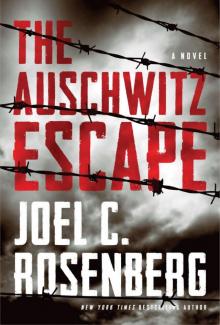 The Auschwitz Escape
The Auschwitz Escape The Last Jihad
The Last Jihad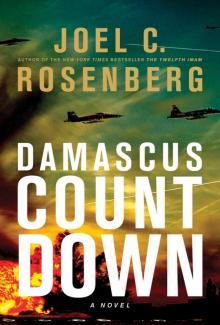 Damascus Countdown
Damascus Countdown The Persian Gamble
The Persian Gamble The Jerusalem Assassin
The Jerusalem Assassin Dead Heat
Dead Heat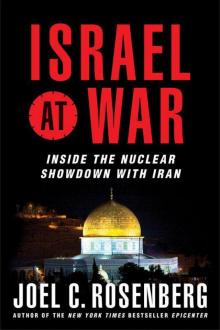 Israel at War: Inside the Nuclear Showdown With Iran
Israel at War: Inside the Nuclear Showdown With Iran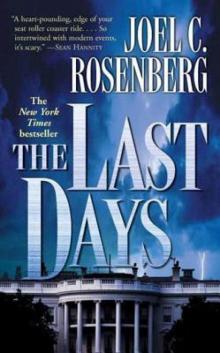 The Last Days
The Last Days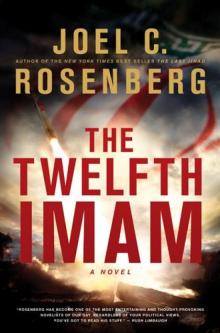 The Twelfth Imam
The Twelfth Imam Epicenter 2.0
Epicenter 2.0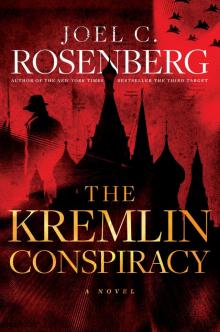 The Kremlin Conspiracy
The Kremlin Conspiracy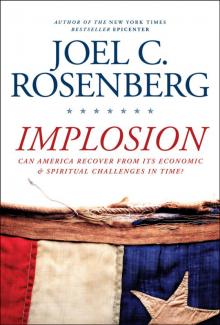 Implosion: Can America Recover From Its Economic and Spiritual Challenges in Time?
Implosion: Can America Recover From Its Economic and Spiritual Challenges in Time?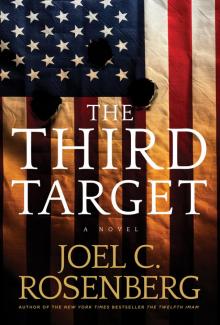 The Third Target: A J. B. Collins Novel
The Third Target: A J. B. Collins Novel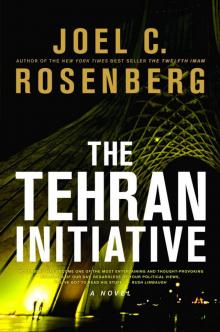 The Tehran Initiative
The Tehran Initiative Inside the Revolution
Inside the Revolution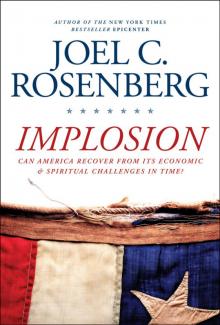 Implosion
Implosion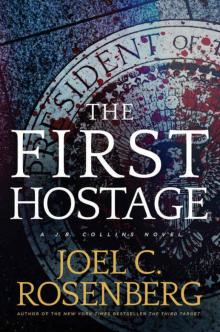 The First Hostage: A J. B. Collins Novel
The First Hostage: A J. B. Collins Novel